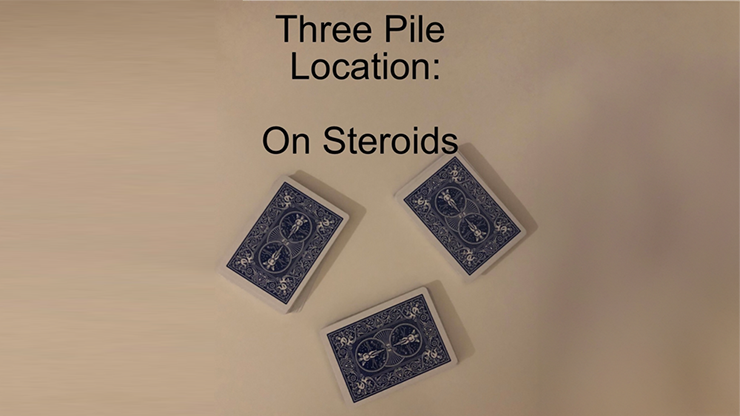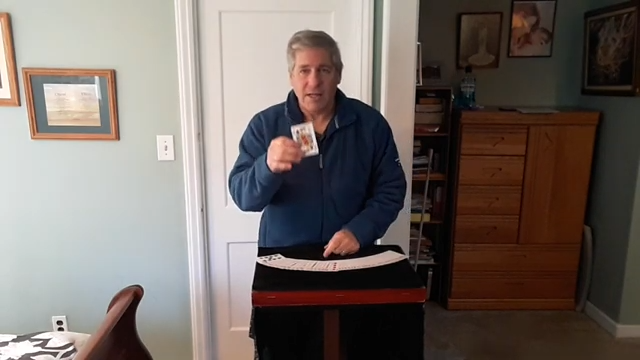Murphy's Magic Supplies, Inc.
Three Pile Location: On Steroids by Unnamed Magician video and PDF - Video Download
Three Pile Location: On Steroids by Unnamed Magician video and PDF - Video Download
Regular price
$15.00 USD
Regular price
Sale price
$15.00 USD
Unit price
per
Shipping calculated at checkout.
Couldn't load pickup availability
This is a very powerful Three Pile Location effect. Typically, in such routines, a distant key card is used, in which case one of the piles cannot be shuffled. Here, however, all three piles can be shuffled by the spectator. Moreover, the spectator can shuffle the entire deck at the beginning of the effect as well.
There is a full performance video attached above, but here is a written description as well:
The magician introduces a deck of cards. He spreads it face up to show that all the cards are different. Next, he invites a spectator to thoroughly shuffle the deck. Once the spectator is done shuffling, the magician takes the deck to demonstrate what they are to do. He cuts off some cards from the top of the deck as he tells the spectator, "I want you to cut the cards from the top of the deck like this in order to make some piles." He then reassembles the deck and hands it back to the spectator as he says, "Let's do 3 piles. So cut the deck into 3 piles." Furthermore, he promises never to touch the deck again until the end.
The spectator takes the deck and cuts it into 3 more or less equal piles: top pile, middle pile and bottom pile respectively. The magician then invites the spectator to pull out any card at random (sight unseen) from the top pile. They do that (after which they look at it). He then says, "If I were to ask you to place your selected card on top of the top pile, you may think I could use the top card of the top pile as a key card. After all, the top card of the top pile is just the original top card of the deck before you split the deck into 3 piles. So, in order to eliminate this idea, shuffle the top pile before placing your selected card on top of it." The spectator shuffles the top pile, after which they place their selected card on top of it.
The magician explains, "Now, if I were to ask you to place the bottom pile on top of the top pile in order to bury your selected card, you may think I could use the bottom card of the bottom pile as a key card. After all, the bottom card of the bottom pile is just the original bottom card of the deck before you split the deck into 3 piles. So, in order to eliminate this idea, shuffle the bottom pile before placing it on top of the top pile." The spectator shuffles the bottom pile, after which they place it on top of the top pile in order to bury their selected card.
The magician continues, "Your selected card is now lost somewhere in between the combination of the top and bottom pile. But there is one pile left over the middle pile. Perhaps, for all you know, I have a distant key card in there. So, in order to eliminate this idea, shuffle the middle pile as well." The spectator shuffles the middle pile, after which they place it either on top of or on the bottom of the other pile (the pile that is the combination of the top and bottom pile).
At this point, the entire deck is reassembled. The magician says, "The only thing I can possibly know about your card at this point is its approximate position in the deck. So, to eliminate this idea, cut and complete the deck a few times as I look away." The magician turns his back to the spectator as they perform the cuts, after which he turns back around to face them.
Now, for the first time since the beginning, the magician touches the deck. He takes the deck, spreads through its face and locates the spectator's selected card.
Some important conditions of note:
There is a full performance video attached above, but here is a written description as well:
The magician introduces a deck of cards. He spreads it face up to show that all the cards are different. Next, he invites a spectator to thoroughly shuffle the deck. Once the spectator is done shuffling, the magician takes the deck to demonstrate what they are to do. He cuts off some cards from the top of the deck as he tells the spectator, "I want you to cut the cards from the top of the deck like this in order to make some piles." He then reassembles the deck and hands it back to the spectator as he says, "Let's do 3 piles. So cut the deck into 3 piles." Furthermore, he promises never to touch the deck again until the end.
The spectator takes the deck and cuts it into 3 more or less equal piles: top pile, middle pile and bottom pile respectively. The magician then invites the spectator to pull out any card at random (sight unseen) from the top pile. They do that (after which they look at it). He then says, "If I were to ask you to place your selected card on top of the top pile, you may think I could use the top card of the top pile as a key card. After all, the top card of the top pile is just the original top card of the deck before you split the deck into 3 piles. So, in order to eliminate this idea, shuffle the top pile before placing your selected card on top of it." The spectator shuffles the top pile, after which they place their selected card on top of it.
The magician explains, "Now, if I were to ask you to place the bottom pile on top of the top pile in order to bury your selected card, you may think I could use the bottom card of the bottom pile as a key card. After all, the bottom card of the bottom pile is just the original bottom card of the deck before you split the deck into 3 piles. So, in order to eliminate this idea, shuffle the bottom pile before placing it on top of the top pile." The spectator shuffles the bottom pile, after which they place it on top of the top pile in order to bury their selected card.
The magician continues, "Your selected card is now lost somewhere in between the combination of the top and bottom pile. But there is one pile left over the middle pile. Perhaps, for all you know, I have a distant key card in there. So, in order to eliminate this idea, shuffle the middle pile as well." The spectator shuffles the middle pile, after which they place it either on top of or on the bottom of the other pile (the pile that is the combination of the top and bottom pile).
At this point, the entire deck is reassembled. The magician says, "The only thing I can possibly know about your card at this point is its approximate position in the deck. So, to eliminate this idea, cut and complete the deck a few times as I look away." The magician turns his back to the spectator as they perform the cuts, after which he turns back around to face them.
Now, for the first time since the beginning, the magician touches the deck. He takes the deck, spreads through its face and locates the spectator's selected card.
Some important conditions of note:
- The spectator shuffles the entire deck at the beginning of the effect.
- During the effect, all 3 piles are individually shuffled by the spectator. Because of this, there are no key cards (whether immediate or distant) in any of the piles.
- The backs of the cards are not marked. So, the magician does not identify the selected card by reading its back (that would be too easy) - in fact, the magician only learns the identity of the selected card at the very end of the routine when he spreads through the deck.
Materials
Materials
Shipping & Returns
Shipping & Returns
Dimensions
Dimensions
Care Instructions
Care Instructions




